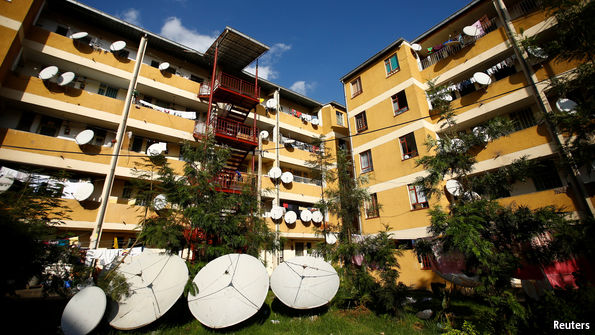Power of the dish-New television channels in Ethiopia may threaten state control
News programmes are likely to follow soaps and game shows

STROLL through Ethiopia’s capital, Addis Ababa, and everywhere you will see satellite dishes, sprouting mushroom-like from roofs, gardens and balconies. “People have roofs to repair, but they are buying satellite dishes instead,” chuckles Abel Adamu, a lecturer at the Addis Ababa School of Journalism. “Wherever you go in Ethiopia, it is the satellite dish that comes first.”
The proliferation of these dishes symbolises the frustration that Ethiopia’s 90m citizens feel with state-owned television. But after years of hankering for a choice in what they can watch, Ethiopians are fast becoming spoilt for one. Four private satellite channels have launched so far this year. More are on the way. Kana TV, which first broadcast in March, has taken the country by storm. Shops and cafés across the country have renamed themselves after it. Conservative commentators decry its foreign soap operas, dubbed into Amharic, for corrupting Ethiopian culture.
The new channels are aimed at Ethiopians and have offices in Addis Ababa but get their broadcast licences from overseas. So far they have stuck to light entertainment, but a slew of news and current-affairs programmes are reportedly in the pipeline. More significantly still, in October the Ethiopian Broadcasting Authority (EBA) announced that it was granting licences to three privately owned satellite channels, a first in the agency’s history. It says it also plans to grant licences to private terrestrial ones early next year.
Not before time. Ethiopians have long been denied vibrant local media. Internet penetration is among the lowest on the continent, and since the government declared a state of emergency in October, following civil unrest, mobile internet services were stopped throughout most of the country until last week.The government also has a fearsome reputation for jailing journalists.There are a handful of independent newspapers, which can on occasion be critical of the government, but they are few in number. Also that month an established local rag, the Addis Standard, announced it was suspending print operations, citing censorship.
But television has been especially crimped. Two opposition-affiliated stations based in America are banned. Until this year, switching on the TV meant choosing between state-owned channels—of which the largest is the Ethiopian Broadcasting Corporation (EBC)—or the mainly foreign-language ones beamed into the country from abroad. Arab shows, such as those that broadcast via Nilesat, an Egyptian satellite company, were enormously popular. Concerned parents reported coming home to find their children speaking Arabic. The exception was the Ethiopian Broadcasting Service (EBS), an Amharic-language station based in America that launched in 2008 and was the only serious rival to the EBC until the arrival of Nahoo TV in January this year.
The dearth of private local channels was not due to legal obstacles. The constitution permits both public and private media. But at the very least the government did little to encourage the latter. This is changing. “We are trying our best to help them,” says Zeray Asgedom, the EBA’s director. There is a recognition inside the ruling Ethiopian People’s Revolutionary Democratic Front (EPRDF) that squeezing private media was a mistake. “Opening up should have happened earlier,” Mr Asgedom admits. The lack of credible independent news left the field open to social-media propagandists, which helped to inflame unrest over the past year, he says. Perhaps so. Analysts agree that the government was hoist with its own petard.
Still, there is some way to go yet. Producing alternative news will be difficult, since the EBC enjoys a near-monopoly on information and access to ministers. And Ethiopian media have “a long history of co-option and capture”, notes Iginio Gagliardone of Oxford University. Indeed, the channels so far licensed by the EBA are not entirely independent of the state. But the signs are positive. So long as Ethiopians stock up on satellite dishes, controlling what they watch will be harder.





